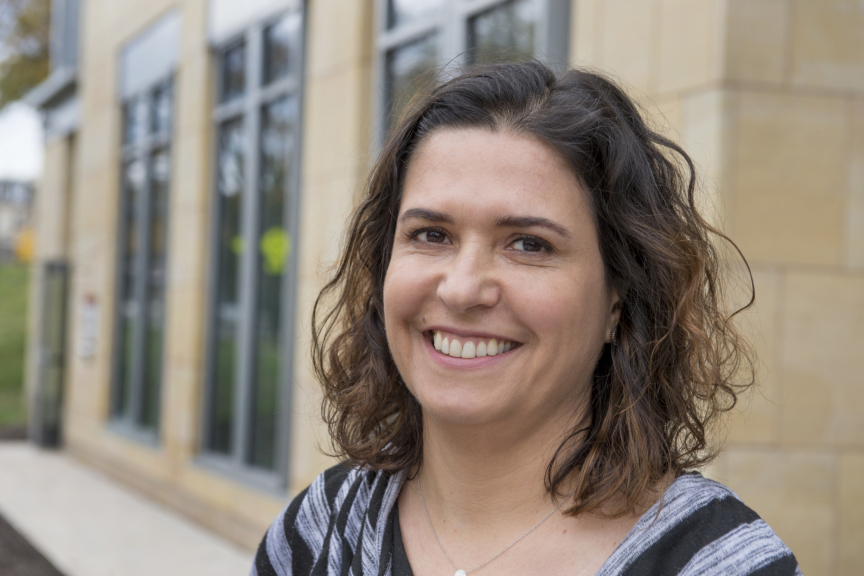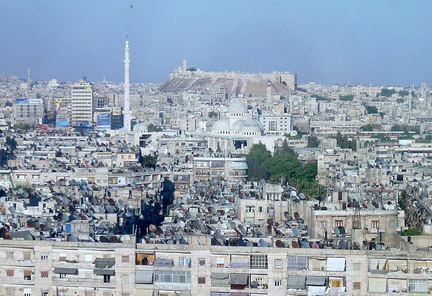Rutgers Professor Fights to Preserve Her Syrian Homeland
Salam Al Kuntar, a Syrian-born archaeologist, comes to Rutgers through a program that aids scholars at risk

“If all things work out, I would like to be part of the reconstruction, the rebuilding plan and restoration . . . I am just trying to survive right now and I might not end up going back to Syria for many years.’’– Salam Al Kuntar
Salam Al Kuntar has spent the past six years fighting to preserve Syria’s ancient cultural heritage to ensure that citizens like her who fled the political uprising will have something familiar to come home to when peace is restored.
Al Kuntar left her job as an archaeologist in Syria as conflict in the country escalated. The fighting made it impossible to work on excavation sites. Project funders and collaborators withdrew. She came to the United States through the aid of an international organization that places scholars at risk at universities to continue their research. Since leaving her homeland, Al Kuntar has become one of the world’s leading advocates for protecting Syrian historical sites and artifacts.
“When people move into the diaspora, they lose their connection with their home country and disappear,’’ Al Kuntar said. “For me, keeping that connection alive and building on it to preserve the spirit of the people is important.’’
Al Kuntar is spending the academic year at Rutgers University-New Brunswick, where she is bringing her experience into the classroom. She is teaching in the Department of Classics and through the university’s Cultural Heritage and Preservation Studies program (CHAPS) in the School of Arts and Sciences. Before Rutgers, she worked at the University of Pennsylvania and New York University.
Prior to the uprising in Syria, Al Kuntar worked for the Directorate General of Antiquities and Museums, a government agency where she oversaw excavation projects, curated exhibitions of artifacts and worked to protect the country’s heritage from modernization and development pressure.
But since leaving Syria, the focus of her work has shifted to doing all she can to preserve her country’s heritage from bombings and the destruction of war. She worked with the Penn Cultural Heritage Center to create a consortium of organizations called Safeguarding the Heritage of Syria and Iraq (SHOSI), which partners with the Smithsonian Institute and the American Association for the Advancement of Science.
Through the consortium, Al Kuntar traveled to Iraq and Turkey, where she organized workshops to train archeologists and other professionals who remained in Syria to protect and preserve museum collections.
Al Kuntar talks about Beirut and other cities that became unrecognizable after they were rebuilt following conflicts, a fate she is trying to avoid for Syria.
“You are trying to preserve a sense of the place that was there,’’ Al Kuntar said. “Otherwise, people might as well be happy in Germany or wherever they end up because their country has lost its sense of place.’’

At Rutgers, Al Kuntar is teaching a class this semester that explores the connection between the Greek and Roman world and the Middle East. She is developing a course for the spring through CHAPS that looks at how war and conflict affect the field of Middle Eastern archeology, and also examines why professionals in the field were not prepared to protect heritage when conflict arose.
The class draws on her criticism that archeologists in the Middle East focused on academic projects rather than engagement with contemporary society. Not enough was done to educate communities about the archeological sites around them, or involve them in the decision making about preservation in times of peace. Many of the heritage sites in Syria are tied to ancient Greek and Roman civilizations, which don't have a direct ancestral connection to contemporary Syrians, but influence the country’s identity, Al Kuntar said.
Al Kuntar’s broad and unique experience is the reason why the School of Arts and Sciences worked to bring her to Rutgers, said SAS executive vice dean James Masschaele.
“I think there is tremendous scholarly value and personal value for our students to have a chance to listen to her story, interact with her and appreciate the sacrifices she has made to pursue her career,’’ Masschaele said.
“I think of her as a model of the kind of people we want our own students to be,’’ he said, “to have the strength of their convictions and be willing to stand up for what they believe in.’’
Al Kuntar said she tries to bring her experience into the classroom, sharing her photographs from sites she has worked at or visited and anecdotes from working in the field. She traces her interest in archeology back to her childhood growing up in the Hawran region of Syria, which has a heavy Greek, Roman and Byzantine influence. Through her studies she became more interested in the ancient civilization of Mesopotamia, which included the eastern part of modern-day Syria and became her primary research focus.
“It was more ancient, more intriguing, more mysterious,’’ she said.
Al Kuntar is currently at Rutgers for a one-year appointment. Her long-term goal is tinged with nostalgia: She wants to return to Syria.
“If all things work out, I would like to be part of the reconstruction, the rebuilding plan and restoration,’’ she said. “Things are very uncertain. I am just trying to survive right now, and I might not end up going back to Syria for many years.’’